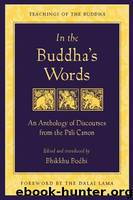In the Buddha's Words: An Anthology of Discourses from the Pali Canon by Bhikkhu Bodhi

Author:Bhikkhu Bodhi
Language: eng
Format: mobi, epub
Tags: Buddhism
ISBN: 9780861719969
Publisher: Wisdom Publications
Published: 2010-07-25T22:00:00+00:00
5. THE HIGHER STAGES OF TRAINING WITH SIMILES
12. “Here, monks, a monk resorts to a secluded resting place: the forest, the root of a tree, a mountain, a ravine, a hillside cave, a charnel ground, a jungle thicket, an open space, a heap of straw.
13. “On returning from his almsround, after his meal he sits down, folding his legs crosswise, setting his body erect and establishing mindfulness before him. Abandoning longing for the world … [as in preceding text, §18] … he purifies his mind from doubt.
14. “Monks, suppose a man were to take a loan and undertake business, and his business were to succeed so that he could repay all the money of the old loan, and there would remain enough extra to maintain a wife; on considering this, he would be glad and full of joy. Or suppose a man were afflicted, suffering and gravely ill, and his food would not agree with him and his body had no strength, but later he would recover from the affliction and his food would agree with him and his body would regain strength; on considering this, he would be glad and full of joy. Or suppose a man were imprisoned, but later he would be released, safe and secure, with no loss to his property; on considering this, he would be glad and full of joy. Or suppose a man were a slave, not self-dependent but dependent on others, unable to go where he wants, but later on he would be released from slavery, self-dependent, independent of others, a free man able to go where he wants; on considering this, he would be glad and full of joy. Or suppose a man with wealth and property were to enter a road across a desert, but later on he would cross over the desert, safe and secure, with no loss to his property; on considering this, he would be glad and full of joy. So too, monks, while these five hindrances have not yet been abandoned in himself, a monk sees them respectively as a debt, illness, a prison, slavery, and a road across a desert. But when these five hindrances have been abandoned in himself, he sees that as freedom from debt, recovery from illness, release from prison, freedom from slavery, and a land of safety.
15. “Having abandoned these five hindrances, defilements of the mind that weaken wisdom, secluded from sensual pleasures, secluded from unwholesome states, he enters and dwells in the first jhāna, which is accompanied by thought and examination, with rapture and happiness born of seclusion. He makes the rapture and happiness born of seclusion drench, steep, fill, and pervade this body, so that there is no part of his whole body that is not pervaded by the rapture and happiness born of seclusion. Just as a skilled bath man or a bath man’s apprentice heaps bath powder in a metal basin and, sprinkling it gradually with water, kneads it until the moisture wets his ball of bath
Download
In the Buddha's Words: An Anthology of Discourses from the Pali Canon by Bhikkhu Bodhi.epub
This site does not store any files on its server. We only index and link to content provided by other sites. Please contact the content providers to delete copyright contents if any and email us, we'll remove relevant links or contents immediately.
The Hating Game by Sally Thorne(19238)
The Universe of Us by Lang Leav(15069)
Sad Girls by Lang Leav(14408)
The Lover by Duras Marguerite(7894)
The Rosie Project by Graeme Simsion(6382)
Smoke & Mirrors by Michael Faudet(6184)
Big Little Lies by Liane Moriarty(5790)
The Poppy War by R. F. Kuang(5688)
The Shadow Of The Wind by Carlos Ruiz Zafón(5686)
An Echo of Things to Come by James Islington(4864)
Memories by Lang Leav(4796)
What Alice Forgot by Liane Moriarty(4626)
From Sand and Ash by Amy Harmon(4511)
The Poetry of Pablo Neruda by Pablo Neruda(4098)
The Tattooist of Auschwitz by Heather Morris(3844)
Ficciones by Jorge Luis Borges(3627)
The Rosie Effect by Graeme Simsion(3461)
Guild Hunters Novels 1-4 by Nalini Singh(3460)
THE ONE YOU CANNOT HAVE by Shenoy Preeti(3368)
